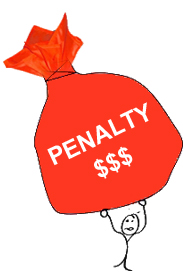Overview of FATCA and its impact on U.S. residents in Canada
Allan Madan, CPA, CA
On February, 2014, the government of Canada and the U.S. has finalized the Foreign Account Tax Compliance Act (FATCA) which will come into effect on July 1, 2014. This agreement will provide the Internal Revenue Service (IRS) with better access to information about US residents’ foreign bank activities and means trouble for US residents who have not been properly reporting their Non-US financial accounts to Uncle Sam.

What is FATCA?
FATCA was introduced in 2010 as a response to increase in abuse of tax cheats using offshore accounts. Under the new Act, most Canadian banks are required to report certain financial information regarding their US resident clients to the IRS or face a severe disadvantage participating in the US capital markets. The IRS will then use this information to determine who has not been reporting all of their foreign financial accounts and impose severe penalties.
What are some of the penalties? If a taxpayer fails to report the ‘Report of Foreign Bank and Financial Accounts’ (FBAR), the default penalty starts at $10,000. For example, if the taxpayer failed to file the FBAR for 4 years, then the penalty would amount to $40,000.
What’s worse is that many Americans living in Canada have no idea that they are US residents for tax purposes. It is estimated that one million US citizens and green card holders reside in Canada and the majority of these individuals will be surprised to find that the US is only one of two countries in the entire world (other country being Eritrea) that treats individuals holding citizenship as residents for tax purposes. This also applies to green card holders. Are you a US citizen only by birth and haven’t set foot in the US since then? Or you are merely a US citizen because one of your parents is a US citizen? Unfortunately, Uncle Sam expects annual US tax returns from you as well.
As you can see, you definitely don’t want Uncle Sam coming knocking at your door. Rather, if you realize that you have not been in compliant with the US tax rules and regulations including reporting of foreign financial accounts, there are several ways to get back into compliance.
Method #1: Streamlined Filing Compliance Procedures for Non-Resident, Non-Filer U.S. Taxpayers

If eligible, this method is the safest means to get back into compliance with Uncle Sam. Under this procedure, the taxpayer must file past three years of delinquent US tax returns as well as past six years of delinquent FBAR. As long as you qualify for this procedure, the penalty associated with late filing FBAR and tax returns will be waived.
In order to qualify, a taxpayer must meet several criteria, including having resided outside of the US since January 1, 2009.
For more information, please see: Instructions for New Streamlined Filing Compliance Procedures for Non-Resident Non-Filer US-Taxpayers
Method #2: Offshore Voluntary Disclosure Program (OVDP)
The purpose of this program is to bring taxpayers that have used undisclosed foreign accounts and foreign entities to evade tax into compliance with US tax laws. OVDP covers the most recent eight tax years and involves significantly more paperwork than Method #1. Furthermore, by going through this program, a taxpayer is almost guaranteed to pay penalties
Why then, should you bother at all with this program? OVDP is closely connected with the IRS’ Criminal Investigation Unit and by reporting your undisclosed foreign accounts/entities you will avoid substantial civil penalties and generally eliminate the risk of criminal prosecution. Therefore, if your foreign activities involve certain illegal activities, you should consider this option. For the average Joe, we do not recommend this program.
For more information, please see: 2012 Offshore Voluntary Disclosure Program
Method #3: If you’ve only failed to file the FBAR forms
If you are a US resident who has properly reported all income and filed all necessary US tax returns for all years but was not aware of the FBAR requirement, you can simply file the delinquent FBAR with the explanation of why it is late. The IRS should not impose a penalty on your late filing.
Method #4: Quiet disclosure
Quiet disclosure is a term that the IRS uses for taxpayer who does not go through any of the methods above and simply files all delinquent returns and files properly prospectively. The IRS generally frowns upon this method and the taxpayer will be at the mercy of the IRS when it comes to penalties and interest. As of today, there is no definitive answer as to whether the IRS will impose strict penalties and interests or be lenient for a taxpayer who has decided to come forth.
Disclaimer
The information provided on this page is intended to provide general information. The information does not take into account your personal situation and is not intended to be used without consultation from accounting and financial professionals. Allan Madan and Madan Chartered Accountant will not be held liable for any problems that arise from the usage of the information provided on this page.



